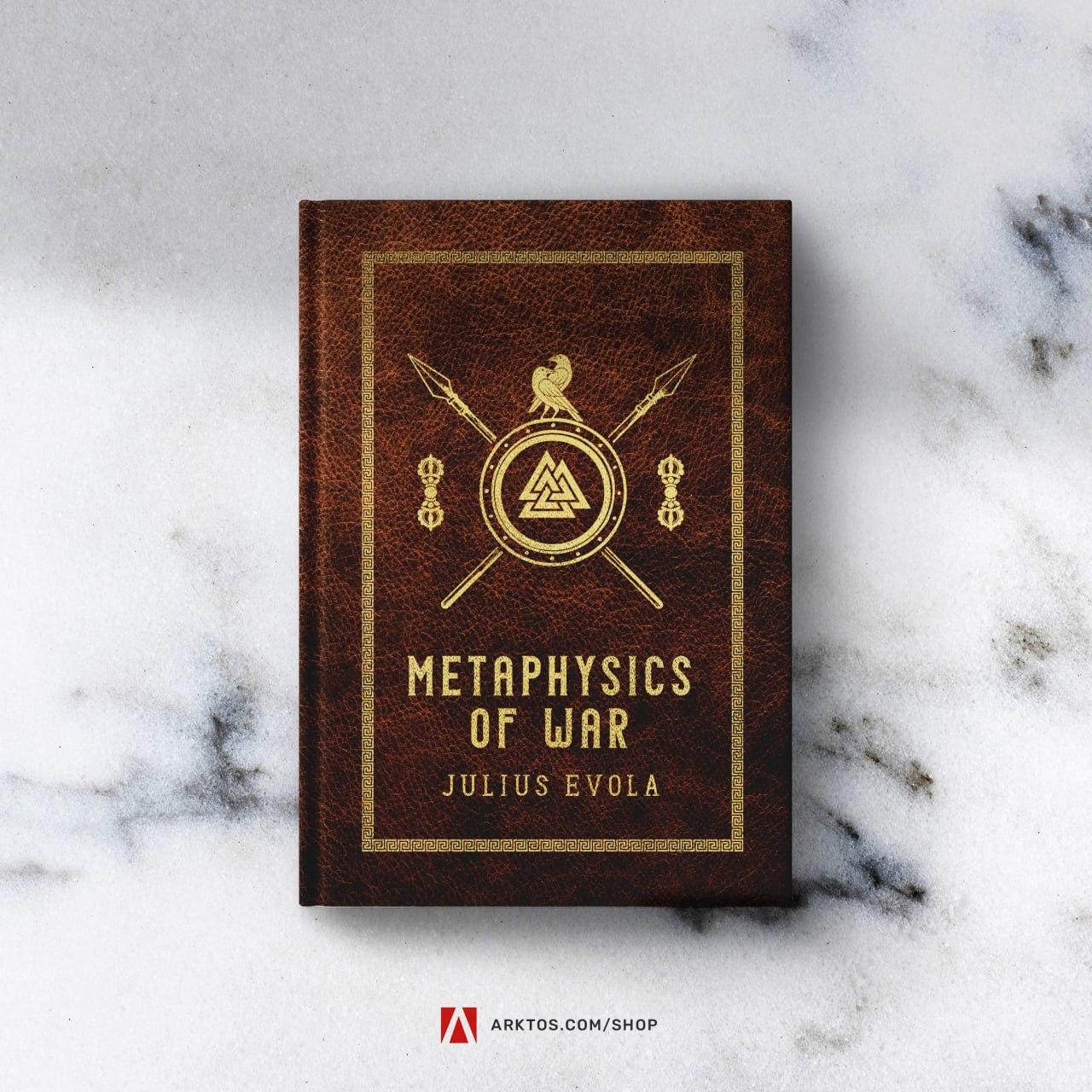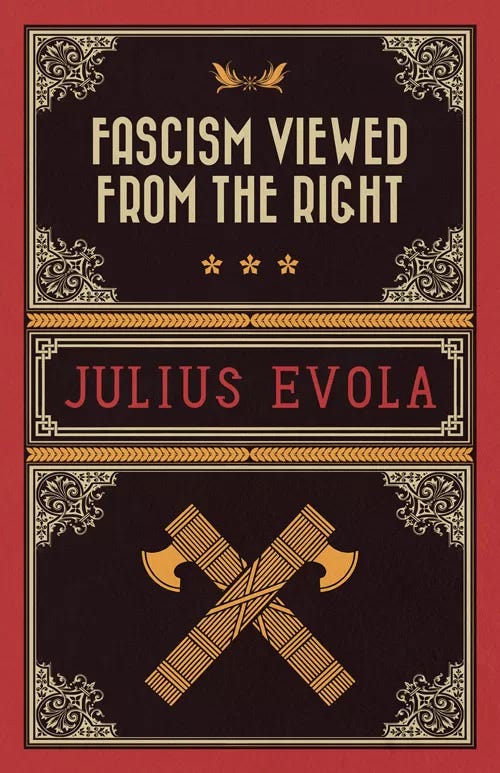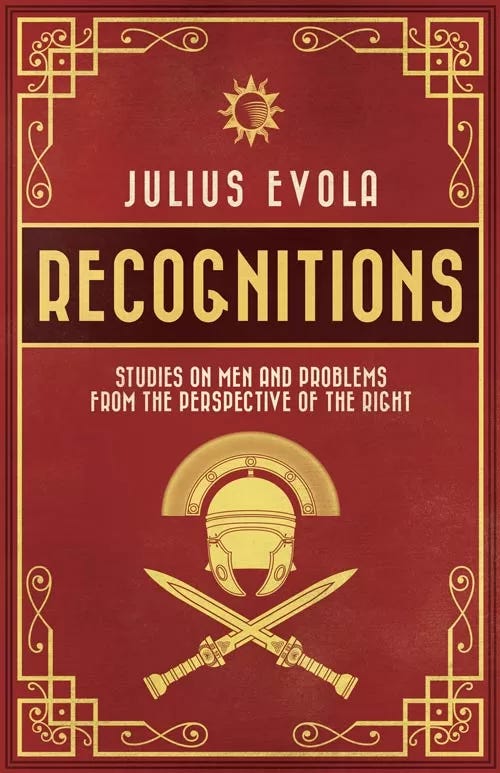Rethinking the Right - Part I
by Julius Evola
In this first installment of a series of Julius Evola’s meditations on the postwar Right, the Italian Traditionalist argues that the Right must grow beyond individualism and reactionary novelty in order to rediscover its historical and traditional roots, affirm its positive vision of the future, and embody the genuine culture it seeks not only to “conserve,” but to cultivate.
The Right and Culture
Today there is often talk of a “culture of the Right,” so much so that the alarm has to some degree sounded in the opposite camp. On the other hand, there are authors who act and speak as if this culture were something that they themselves had today fabricated or invented. Now we would not know how to conceive of a true culture of the Right without some reference to a tradition, and at an opportune distance from individualism. It is precisely the habit of the man of the left, of the revolutionary and the “progressivist,” to valorize the new, without any continuity or organic connection.
If one does not perceive this point clearly, there is danger that this culture of the Right, of which there is so much talk today in Italy, will reduce itself at least in part to simple formulae. For this reason some have held that the phenomenon of a “culture of the Right” has been overestimated and that the apprehensions displayed by the predominant culture, which is left-leaning and which has at its disposal precise enough an ideology, are unjustified.
Now, setting aside those authors who today envisage things almost as if the culture of the Right were their own invention tossed into the market of ideas, it is not easy to perform the task of giving a positive content to this culture. We have said “positive,” because a definition based only on spurning, on critique and opposition, cannot suffice.

Moreover, this task and this difficulty appear equally with respect not only to the “culture” of the Right, but also to the Right in general as a political formation and a vision of the world. (The economic Right must obviously be set aside: in the present context it has no interest for us.)
Indeed, what can one call the antecedent of the political Right in Italy? Certainly, the so-called “historical Right” has existed: but while one must justly bestow recognition on the figure and the activity of a Crispi, a Di Rodinò, and other surely worthy personalities of the time, one must also agree that, on account of the very atmosphere of post-Risorgimento Italy, this Right is not at all to be compared in any way with what the conservative Right has been, for example, in central Europe, where it could relate itself to precise traditions and to equally precise social articulations, given that the ideological influences deriving from the French Revolution had taken little enough hold in such countries. Even today in Italy, the presuppositions for an integral and traditional Right are sadly lacking. Indeed neither democracy nor republic can form the congenial soil for such a Right.
It is difficult enough for us to conceive of a true Right without a monarchy and an integral aristocracy as a political class. A Right which reduces itself to generic nationalism and to the defense of those values proper to a bourgeois society—Catholic or otherwise—is naught but a very approximate Right.
Even the culture of the Right cannot help but be touched by the general cultural, political and social situation. To ward off the accusation or the insinuation that the “culture” of the Right today is but a phenomenon owing to circumstances alone, it would be necessary to indicate its antecedents; but these are sporadic. It will seem natural, for some, to refer to the Fascist period. But then one must make certain distinctions, because it remains to be seen to what measure fascism, on the whole, can be considered as a pure movement of the Right; on this point, we might redirect the reader to the contribution we have afforded in our study of fascism, entitled Fascism Viewed from the Right, published by Volpe.
If we seek some antecedent in the culture of the precedent period, we might consider, for example, the historian Gioacchino Volpe, and Vilfredo Pareto ever remains a figure of the very highest anti-conformist and anti-democratic sphere. We would rather set aside the Corradinian current, as its predominant trait is political nationalism (a certain kind of nationalism might even be the antithesis of the Right). In the field of journalism, rather precise positions were most recently defended by G.A. Fanelli. Fanelli is a lively monarchical and traditionalist writer, director of a journal and author of a book of the title Vigliaccherie del secolo XX. A small and fairly well-knit group formed around him, in which Nino Serventi and Nino Guglielmi played a role, among many others.
We must also reluctantly mention our own activity of the same period (our book Revolt Against the Modern World, decidedly a work of the Right, issued in first edition in 1933). The group of collaborators in the Il Regime Fascista’s special page, entitled “Diorama,” was certainly formed by exponents of a true and proper culture of the Right, and it is worth highlighting that foreign collaborators of the same orientation united with them. Today. Giuseppe Prezzolini has sought to valorize his past as a conservative, and has also recently published a little volume wherein he has enunciated his theses on conservatism; but in all sincerity we do not feel like taking him very seriously. Many other references to an authentic cultural tradition of the Right could however be indicated.
So far as the present period goes, it would be opportune to take a close look at the “credentials” of those who are generally considered as the exponents of the culture of the Right, for it is always easy to apply labels without very carefully examining the contents. As is known, whenever there is the sense that something is gaining ground, many gather around it and even convert to it with growing frequency. As a perspicuous example we recall what occurred at the moment of the “racist” fascist revolution: an entire series of publicists unexpectedly realized, from one day to the next, that they too were “racist.” And the beauty of it is that these same gentlemen today find themselves amongst the democrats and the antifascists.
An intellectual still needs a certain courage to proclaim himself for the Right today. It is just for us to recognize such courage, but this does not touch the specific, objective question of merit. For we should then ask if this intellectual commences from a general and precisely characterized vision, a vision of life and of history itself, proceeding to all the rest only consequentially. One cannot always observe this in the alleged culture of the Right today, while, as has been noted, the connections of this Right with any antecedents are nigh non-existent. The accusation is often made that this entire Right in the last analysis is fabricated and improvised, and, given certain attitudes in the Right, one cannot help but recognize that this critique does not appear entirely unjustified. It is only an extenuating circumstance that the prevalent cultural climate in Italy has not been such as to furnish consistent footholds for such a culture. There is in reality a vast field of work: having a right and serious orientation, shunning improvisations—these will be the decisive factors.
The above text is an excerpt from Julius Evola’s Recognition: Studies on Men and Problems from the Perspective of the Right, brought to you in English by Arktos:






Una destra auspicata da Evola oggi è solo una chimera. Manca la cultura di base, manca la volontà da parte dei filosofi di divulgarla, mancano i politici che provino attuarla, perché quest'ultimi guardano al potere fine a sé stesso e non al benessere della società.